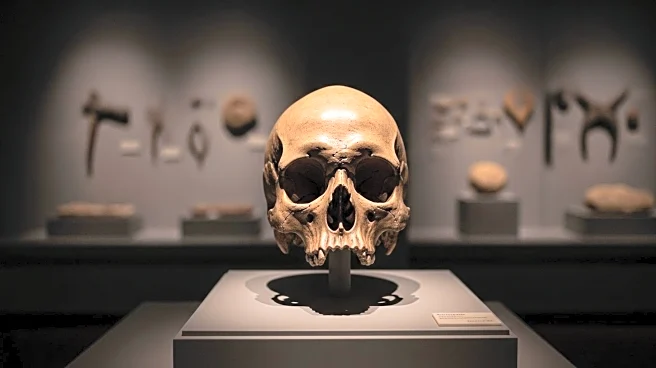What is the story about?
What's Happening?
An ancient human skull discovered in China's Hubei Province has been digitally reconstructed, revealing it as part of a sister lineage to Homo sapiens. The skull, dating between 940,000 and 1.1 million years old, suggests a revision of the human evolutionary timeline. Researchers used advanced scanning techniques to reconstruct the skull, which appears to belong to an evolutionary lineage that includes Denisovans, known for interbreeding with Homo sapiens. The skull, named Yunxian 2, was initially classified as Homo erectus but exhibits features indicating it belongs to a different lineage. This discovery may alter the understanding of human evolution, suggesting that major branches of large-brained humans began diverging over a million years ago.
Why It's Important?
The findings challenge the traditional view of human evolution, suggesting that the divergence of human lineages occurred earlier than previously thought. This could redefine the role of Asia in human evolution, highlighting its significance alongside Africa and Europe. The discovery may lead to a reevaluation of the interactions and migrations of early human species, impacting theories on the development and spread of Homo sapiens. The study emphasizes the complexity of human ancestry and the need for continued exploration and analysis to fully understand our origins.
What's Next?
The scientific community is expected to further investigate the implications of this discovery, potentially leading to new excavations and studies in Asia. Researchers may focus on comparing these findings with other fossil records to build a comprehensive understanding of human evolution. The study may prompt discussions and debates regarding the established timelines and models of human ancestry, potentially leading to revised theories and educational materials.
Beyond the Headlines
The discovery highlights the importance of technological advancements in archaeology, allowing for more accurate reconstructions and analyses of ancient fossils. It also raises questions about the narratives of human origin and the emphasis placed on certain regions, potentially leading to a broader recognition of diverse contributions to human evolution. The study underscores the complexity of human history and the ongoing quest to uncover the mysteries of our past.















